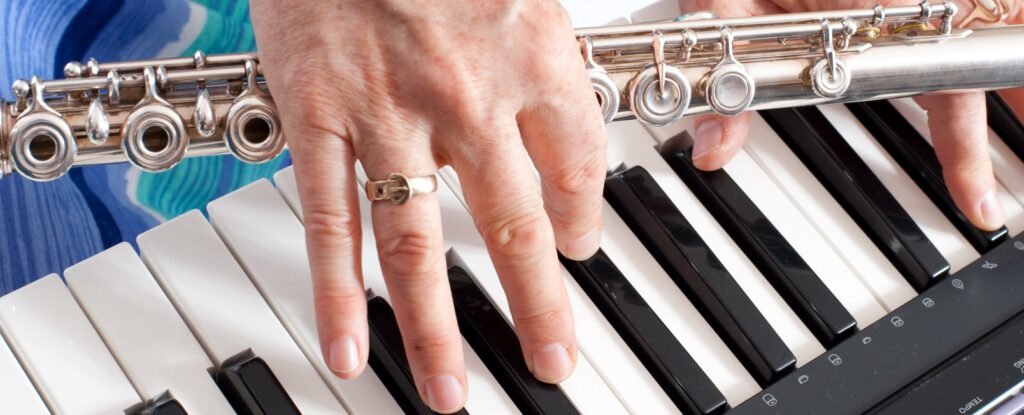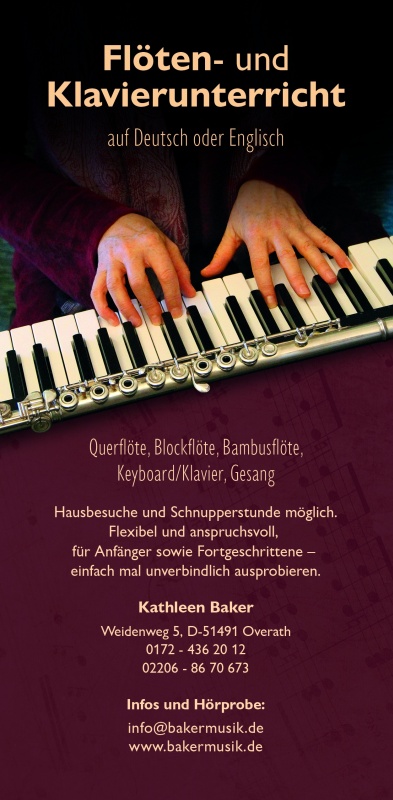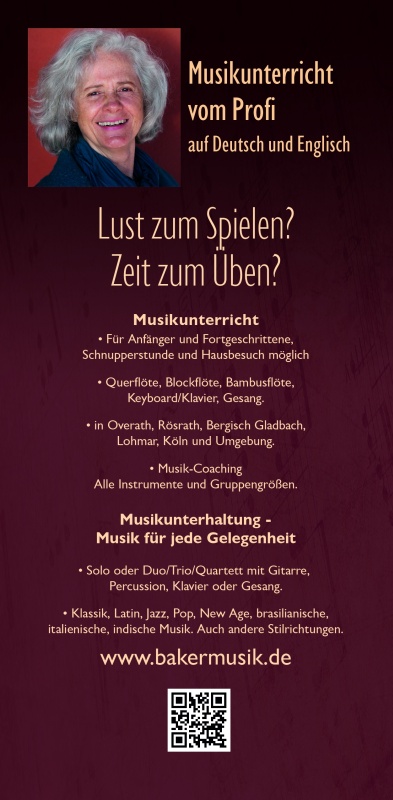
music lessons
MUSIC LESSONS FOR ALL AGES
Study or just play for fun.
Lessons in English or German.
...Online, too!
And: rates
Here: some recommended Music Books
Flute, recorder, keyboard/piano and voice
Book a trial lesson! For an extra fee, lessons at your home may also be possible.
What music can do:
Music increases the intelligence of your children!
Music makes children smart. This has long been proven. But that music can also be fun should also be mentioned at this point. Music has a very special effect when your children make music themselves. Like no other activity, this stimulates the brain and the two hemispheres of the brain "spark" back and forth much more intensively. Children learn to listen carefully, to perceive their own feelings and also to express them in the form of music.
When we play an instrument, we are engaging in one of the most complex activities. The unique interplay of movement, intellect and emotion has a phenomenal impact on the mental development of children.
People have compared children who had similar IQ scores measured at the beginning of the study. Just four years later, the children with music education showed a significant IQ increase. Children who are socially disadvantaged and have received less support during development also benefit from music education.
This is because the beat, tempo, notes and expression are read from the sheet music, processed simultaneously and transformed into music via the child's own voice or fine motor skills when playing an instrument.
What is particularly astonishing is that the time spent learning an instrument, practicing and making music together is not detrimental to the children's performance at school. Rather, it shows an advantage over children with no musical training in the subjects of math and the languages.
As long as your child is interested in music and has a desire to learn an instrument, encourage him or her in this urge to invest some of their free time in what may be the most enjoyable hobby. Let your child try it out and get advice from the music school in your area.
Music Makes You Happy
No wonder.! Because humans, or rather the brain, secrete a lot of dopamine when making music - happiness hormones that the body produces itself and that it also sends through the bloodstream during sports that keep the brain young.
When listening to music, the structures are first processed in the brain stem. Music enters consciousness when it reaches the auditory cortex (the hearing center). There, instruments or voices are distinguished.
Music is good for the head: Studies show clear differences between professional musicians and the "normal population" in the activity expression of the "higher" brain areas that are crucial for the cognitive processing of sound (primary cortex) and melody (secondary cortex). When we listen to music, many other brain areas go into action, processing experiences and associations.
Making music makes you smart
Music and intelligence - a pair that seems to belong together. Yet it is not certain whether people who make music are intelligent or whether intelligent people are more likely to make music. As always, the answer lies somewhere in between.
In 1993, experts took notice when U.S. psychologist Frances H. Rauscher from the University of California in Irvine reported that some of her students solved spatial tasks better if they had listened to a Mozart piano sonata for ten minutes beforehand. Since then, the phenomenon has become known as the "Mozart effect."
Too good to be true: Ten minutes of a Mozart piano sonata increases intelligence. Music builds memory, improves language skills, increases general intelligence. This was the unanimous opinion more than twenty years ago. But the thesis that music makes you smart is no longer true today. Errors in the methodology of the study at that time now call the IQ-increasing effect into question. And there is a considerable difference between simply listening to music and playing it oneself.
Die Musik macht's - Mozart-Effekt reloaded
Whether Mozart really makes you smart has long been disputed. A study from Finland gives the debate new impetus. A team of researchers led by Irma Järvelä, a lecturer in medical genetics at the University of Helsinki, has studied the effect of classical music on the brain. Their March 2015 results show for the first time that listening to a Mozart violin concert increases the expression of certain genes while decreasing others. This could increase cognitive abilities, such as learning and remembering. However, this effect was only seen in musically trained subjects. The question remains open as to whether the observed effects can also be achieved with other music genres such as jazz and pop.
During sleep
Pieces of music are easier to rehearse if you listen to them while you sleep. This is shown by an experiment conducted by James Anthony and his colleagues at Northwestern University in Evanston. They played one of two melodies to test subjects in deep sleep, which they had previously practiced on a piano keyboard. After the sleep phase, the test subjects were able to play this melody better and with fewer errors than the melody that had not been repeated in this way. A short sleep can therefore already help to consolidate a newly learned skill.
When learning
Musicologists at the Technical University of Dortmund had a group of 15- to 17-year-old students in a tenth grade comprehensive school perform an intelligence test with and a concentration test without music. In another group, this was done the other way around. The result: when listening to their own favorite music, the noise carpet did not have a detrimental effect on the students' ability to learn. Performance remained the same.
Sound makes the music
William Forde Thompson of the University of Toronto and his colleagues were able to show that musically trained children could more confidently identify the expression of sad, happy, fearful or angry spoken sentences than non-musically trained children. It is the melody of the sentence that enables us to correctly classify a statement.
Practice early
The sense of hearing develops in fetuses very early in pregnancy. For many parents, that's reason enough to start playing music to their children while they are still in the womb. This is how they are supposed to become the heirs of Bach, Brahms and Beethoven. But babies can actually learn melodies during the last part of pregnancy - and even store them in long-term memory.
Better hearing
Adults who had a few years of music lessons in childhood and adolescence can later process sounds more effectively than musically untrained listeners. This helps especially in understanding speech better in noisy environments, such as loud music in a restaurant or background noise in an open-plan office. The fact that music instruction in childhood improves ability in processing heard speech is particularly exciting because this ability is the first to fade as we age.
"Children need music, but not because music is a useful brain trainer; it doesn't make them smart any more than it makes them stupid. But it challenges the brain in a rarely complex way, because making music combines hearing and seeing, feeling and touching, movement and coordination, imagination and creativity in a particularly intensive way. In this respect, the best thing we can offer a child is to sing to him and with him, to play and dance."
Prof. em. Dr. Wilfried Gruhn, music educator at the Musikhochschule Freiburg and since 2009 chairman of the International Leo Kestenberg Society, Berlin
Do you have tones?
Practice early if you want to become a master on the flute. No one seriously questions that a musical education is beneficial for general education. In any case, it increases mental agility, the ability to quickly adapt from one thought to the next. And it has a positive effect on children's language skills. That's according to neuroscientist Sylvain Moreno of the Rotman Research Institute in Ontario.
Talking a few bars
Stefan Koelsch and Sebastian Jentschke from the Max Planck Institute for Human Cognitive and Brain Sciences in Leipzig have discovered why this is so: Instrument sounds and human speech are very similar. Thus, our brain reacts to speech and to tone sequences with almost identical activity patterns. The human brain, the scientists suspect, does not seem to make any significant difference between musical and linguistic information. In other words, active music-making can boost intelligence and improve children's academic performance. However, the effects are small and can also be achieved through reading training, for example.
No one is unmusical
In a long-term study starting in April 2016, music psychologist Daniel Müllensiefen from the University of London wants to find out how musical abilities develop between the ages of 10 and 20. In preliminary studies with school children in England and Baden-Württemberg, Müllensiefen and his team have established that there are intersections between musical abilities, good grades at school, intelligence and the young people's own perceptions. The long-term study in Hanover is expected to yield well-founded results on the assumed positive effects of playing music.
Müllensiefen has found a new way to measure musicality, which he calls musical experience. Based on a questionnaire and a variety of practical tests, he determines the so-called Goldsmith Musical Sophistication Index (Gold-MSI).
The five-year cooperative project at the Hanover Music Lab of the Hanover University of Music, Drama and Media is funded with 250,000 euros from the Alexander von Humboldt Foundation.
"People who believe they can improve by practicing are often musical. We want to find out whether this attitude is there first or whether children perhaps learn from an instrument that you can achieve something by practicing."
Music psychologist Daniel Müllensiefen, University of London
Links to the topic
Music project at elementary schools
The "Every Child an Instrument" project, or JeKi for short, is a music education initiative. Its goal is to offer every elementary school child the opportunity to learn a musical instrument of his or her own choice.
Pilot project in Bavaria
On the initiative of the University of Erlangen-Nuremberg, the Bavarian State Ministry of Education and Cultural Affairs and the Bertelsmann Stiftung launched the school development project "Musical Elementary School Bavaria“ .
Piano Playing: One Of The Keys To Brain Health
A post (PDF) on Dr. Andrew Weil’s website in english. (Download the PDF document on your computer or use Deepl.com, Google Translate or similar for automatic translation).
Information on music
The Deutsches Musikinformationszentrum is the central point of contact on the subject of music and musical life in Germany. It documents trends and developments, collects current data and facts and provides information on fields of musical culture.

Note:
Renting flutes at flutissimo.de


contact via email or phone:
Email: info (at) bakermusik.de
Mobile +49 172 436 2012
(see also page contact)